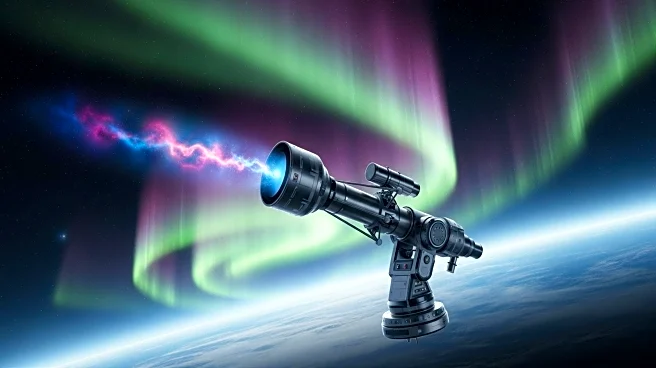What is the story about?
What's Happening?
The James Webb Space Telescope (JWST) has made significant discoveries regarding the rogue planet SIMP-0136, located approximately 20 light-years from Earth. Researchers found that auroras on SIMP-0136 are responsible for heating its upper atmosphere, a phenomenon not observed on Earth. The planet exhibits constant global cloud coverage composed of silicate grains, contrasting with Earth's water-based clouds. This study, led by Dr. Evert Nasedkin from Trinity College Dublin, builds on previous research that identified atmospheric clouds and carbon chemistry variances but could not determine the processes behind these variances. The latest findings confirm that auroras are responsible for the atmospheric changes and thermal inversion observed on SIMP-0136.
Why It's Important?
The discovery of auroras heating a rogue planet's atmosphere provides new insights into planetary formation and evolution, particularly for planets that do not orbit a star. Understanding these processes can help astronomers better comprehend the atmospheric dynamics of rogue planets, which are estimated to number in the billions or trillions within the Milky Way Galaxy. This research could also inform future studies on planetary atmospheres and the potential for life on planets with similar conditions. The findings highlight the capabilities of the JWST in providing precise measurements of extrasolar objects, advancing the field of astronomy.
What's Next?
Future research will likely focus on further understanding the atmospheric properties of rogue planets and the role of auroras in their climate systems. The upcoming launch of the Nancy Grace Roman Space Telescope in May 2027 is expected to enhance the study of rogue planets by filtering their numbers and providing more detailed observations. Continued exploration of SIMP-0136 and similar planets may reveal additional atmospheric phenomena and contribute to the broader understanding of planetary science.
Beyond the Headlines
The study of rogue planets like SIMP-0136 challenges traditional notions of planetary systems, as these planets do not have a star to orbit. This raises questions about their formation and the potential for unique atmospheric conditions. The discovery of silicate grain clouds on SIMP-0136 suggests that rogue planets may have diverse and complex atmospheres, potentially influencing their habitability. The research underscores the importance of advanced telescopes like the JWST in expanding our knowledge of the universe.
















